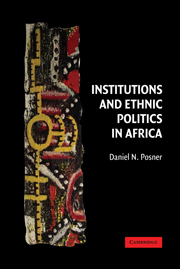IV - Introduction to Part IV
Beyond Zambia
Published online by Cambridge University Press: 05 June 2012
Summary
Why, and when, do some social cleavages emerge as politically salient rather than others? In the preceding pages, I have sought to shed light on this question by exploring the case of Zambia – a country that, for the complexity of its ethnic landscape, the richness of its empirical record, and the advantageous pattern of its institutional variation, offers a particularly good laboratory for studying the determinants of identity choice and cleavage change. The specific outcome that I have sought to explain in the Zambian case is why tribal identities served as the basis of electoral mobilization and voting during one-party elections and language group identities played this role during multi-party elections. I began by showing why tribe and language, but not other possible bases of social mobilization, are available to Zambian political actors as potential foundations for political coalitions. Then, to account for why political actors find it advantageous to identify themselves in terms of one of these ethnic identities rather than the other, I developed a simple model to account for why people embrace the ethnic identities they do. Finally, I showed how the incentives that the model illuminates are affected by changes in the rules that specify whether one party or many may legally compete in the political arena.
In its general form, the central argument of the book can be summarized as follows: given a widespread expectation that elected officials will favor members of their own ethnic groups in the distribution of patronage benefits, voters will seek to better their lot by electing members of their own ethnic groups to positions of political power.
- Type
- Chapter
- Information
- Institutions and Ethnic Politics in Africa , pp. 251 - 255Publisher: Cambridge University PressPrint publication year: 2005



